
HEALTH AND HAPPINESS
Taking care of your health on
the road is not an easy job for most truckers. At the clinic where I work as
a Nurse Practitioner in Laredo, Texas, a NAFTA city on the border with Mexico,
lots of truckers come through with a variety of health issues. Some of them
are acute problems that need taking care of right away; others are chronic.
I see a lot of truck drivers for their DOT initial and renewal physicals, at
which time we discuss any smoking, drinking, social problems (like not enough
money) or emotional problems (like depression) that the truck driver might have.
So, what are the most common things that come up? In terms of acute problems, STDs (sexually transmitted diseases) and bladder infections seem to present themselves frequently in both men and women. Many truckers are overweight or obese (greater than 20% over their ideal weight). Many are smokers. Lots of times the conversation revolves around eating better, lowering cholesterol and how to quit smoking. But taking care of yourself on the road is hard to do. Fast food restaurants, long, sometimes lonely days, no way to exercise, miles between bathrooms... you know what Iím talking about.
EATING
BETTER |
 |
Some of the things I recommend are simple
and donít require a lot of planning or thought. For example, if you want to
eat better, try to go to the places where you know there is a wide variety of
foods, including salads. Salads may not be your idea of a good time, but there
are a few things you can do to make them more interesting and flavorful. Try
low fat or fat free dressing; if you must have the fat-filled kind, order it
on the side and just eat what you absolutely must.
Keeping a bottle of water with you and drinking it frequently will help you
in a number of ways - it helps keep your urine dilute so you are less likely
to develop an infection or a kidney stone, and it fills you up so you will not
feel hungry. The reason to prevent or treat high cholesterol and triglycerides
(another type of blood fat) is because the cholesterol causes irregular, bumpy
plaques (clumps of fatty material) on the insides of the arteries, the blood
vessels that carry blood full of oxygen around the body. Blood cells can get
snagged on the plaques creating clots that may break loose, traveling through
the body and causing a heart attack or a stroke.
Keep in mind that you should eat a combination of at least 5 fruits and vegetables
every day. There is a lot of evidence that high fiber (as in raw fruits, vegetables,
beans, whole grain foods and nuts) may help to prevent cancer. Apples and pre-peeled
carrots are easy to keep and carry without a lot of fuss. Eating poorly contributes
to being overweight; being overweight contributes to high blood pressure, high
blood fats, diabetes, joint aches and pains and lower self esteem, which may
contribute to depression. You may need a specific diet recommended by your health
care provider to really lose weight in addition to exercise.
Meanwhile, there are a few tricks you might want to try - for example, if you
put your food on a small plate, it appears to be more food. It takes about 20
minutes or so for your brain to register the fact that your stomach is full.
So, if you take a little while longer eating, youíll be more aware of the sensation
of fullness, rather than wolfing down all your food quickly and then having
that stuffed, canít-breathe-too-well feeling. Itís a good place to slow down
the pace in a profession where speed counts.
Donít be too rough on yourself if you stray from the straight and narrow - that
just makes many people want to eat more because they feel badly about themselves.
A healthy response to a day of poor eating is to eat better tomorrow. Just take
it one day at a time.
GETTING
A MOVE ON |
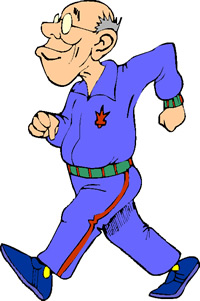 |
Once again, try a few simple things - park far away from your destination, thereby adding a few extra steps during the day. And you donít need to run a marathon! Studies have shown that walking about 30 minutes per day is a great way to burn calories and keep your heart in good shape. Walk around a mall if the weather is bad. Watching your diet is important, but itís not the final word in weight loss. Exercise is equally important for losing and maintaining weight loss and for preventing diabetes. Activity also makes you feel more energetic, less tired and happier. So get moving!
YOUR
KIDNEYS |
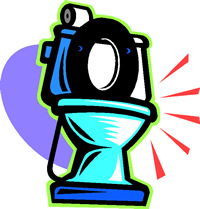 |
Cranberry juice is great for preventing
urinary tract infections. Never pass up the opportunity to use a bathroom, even
if you donít have to go at that moment. If there are bacteria present in the
urine - normally there arenít - they like to multiply in the warm, dark environment
of the bladder. Emptying it frequently prevents that from happening.
If you have ever had a kidney stone (and youíll know if you have because the
pain is excruciating), itís very, very important to keep well hydrated to prevent
a new stone from forming or an existing one from getting bigger. Women are more
likely than men to get a urinary tract infection, but that doesnít mean a man
canít get one. The danger of such infections is that if the infection isnít
taken care of while itís still in the lower part of the urinary tract (the bladder),
it can travel upward into the kidneys, usually causing severe back or abdominal
pain, nausea, fever and possibly permanent damage to the kidneys. If you do
develop symptoms of urinary burning, frequency and/or urgency, it is very important
to see a health care provider who can test your urine and prescribe medication
for you as soon as possible.
SEXUALLY
TRANSMITTED DISEASES (STDs) |
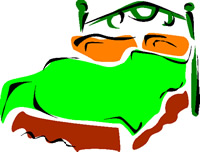 |
Now, on to that ever uncomfortable topic
of sexually transmitted diseases (STDs) - they used to be called venereal diseases
(the clap, lues, drip, VD) - one of those things that most people donít like
to talk about. However, itís important to have reliable information on how to
prevent such diseases and know what to do just in case you donít prevent it.
There are many STDs, some of which are not commonly known, so itís really necessary
to be checked by a health care professional.
Among the better known ones are gonorrhea, chlamydia, syphilis, herpes, HIV
and genital warts. The more partners you have had, the greater your risk of
contracting an STD. The curable ones are gonorrhea, chlamydia, syphilis and
genital warts (also called condyloma). Symptoms vary from men to women. Many
women will not have any symptoms, or have very vague symptoms of urinary discomfort,
pain during sex and, sometimes vaginal discharge. For men itís usually easier
to tell - the discharge (drip) will be from the penis in the case of gonorrhea,
and where goes gonorrhea, usually goes chlamydia. Gonorrhea untreated can lead
to arthritis and sterility; chlamydia may cause sterility and chronic pelvic
pain in women.
If a man has an ulcer (like a little crater) on his penis, that DOESNíT
HURT watch out! Itís the painless ulcers, which go away after a while,
that may indicate syphilis. And, of course, theyíre the ones you are most likely
to ignore. Syphilis is diagnosed by analysis of your blood. If untreated, it
may cause damage to your brain after several years. Herpes causes a cluster
of fluid filled bumps that may start out as an itchy feeling and end up being
painful.
You may be HIV positive or have herpes and not have any symptoms for many years.
If you have been at risk for acquiring an STD, may as well throw in a test for
HIV; it is much more treatable these days than in the past, even though it is
not curable. Now the bad news: there really is no ďsafeĒ sex, only ďsaferĒ sex,
but no method is 100%, except for no sex at all. The condom is still highly
recommended for protecting yourself, but it cannot guarantee your safety. And
birth control pills or other family planning methods used by women are not protective
against STDs! From pregnancy, yes - STDs, no - so be careful.
If you test negative for HIV today, you still need to have another test done
in 6 months. The blood test is looking for antibodies, your bodyís response
to the infection. Sometimes it may take a while, as long as 6 months, to develop
those antibodies against the disease. So, your first test may be negative because
no antibodies show up, but you might still be infected. Itís especially important
to be tested regularly if you repeatedly engage in unprotected or poorly protected
sex.
The difficulty in getting tested on the road is that your health care provider
may need to treat you presumptively, that is, presuming that your tests are
going to show an infection. Since most truckers donít have a lot of time to
spare, there often isnít enough time to wait for the results of the different
cultures and blood tests that need to be done. You may end up getting treated
for something that clinically looks like a particular infection but may turn
out not to be when the lab tests come back. More than likely, your health care
provider is not going to give you your results over the phone so you are going
to have to return to the clinic or office where you had them done. Because HIV
is such a sensitive issue, most states have made it necessary to do it that
way. And, itís a good idea to have some counseling around the results, in particular
if they are positive. Partner notification is something you might want to think
about also. If you know you have something wrong, the nice thing to do is to
let your partner know so he/she can be treated also.
Whereís the best place to be treated? Health departments generally have offices
which deal with treatment and tracking of STDs and will treat you for free or
at low cost. In fact, many health departments give you the option of confidential
HIV testing or anonymous testing. With confidential testing, your name is used
and you give information regarding your address, etc. Anonymous testing involves
getting a number; no names are ever used to increase the protection of your
privacy. Wherever your testing is done, the health care provider is required
by law to maintain confidentiality and may only share your information with
those who need to have it (such as your insurance company).
TOBACCO
USE |
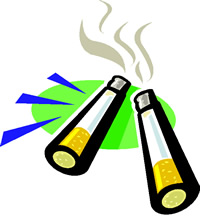 |
What is one of the most difficult things
in the world to do? Quit smoking! Itís not that youíre just weak-willed. Tobacco
is highly addictive and it takes a tremendous effort to stop using it, whether
you smoke it or chew it. There are many behavioral changes that need to take
place so that you can stop associating the tobacco use with things like having
a drink, finishing a meal, or talking on the phone.
If you are thinking about quitting, make a list of all the good reasons to do
so. The American Cancer Society has programs to help you quit and your health
care provider can assist your efforts by prescribing medications that may be
appropriate for you. You can buy nicotine patches over the counter without a
prescription if you want to wean yourself from the tobacco use, but itís very
important not to be smoking and using patches at the same time and to heed the
warnings on the labels.
STRESS |
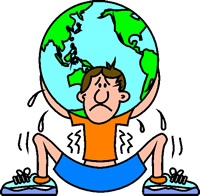 |
Some people like to spend long periods
of time alone. For others, it causes stress. They feel lonely and bored and
unhappy. Having to wait a few days to pick up a load may not make the situation
any better. Ideally, you donít want to deal with stress by overeating or self-medicating
with alcohol or other drugs. One of the best methods of stress reduction is
deep breathing. It costs nothing, anyone can do it, and, silly as it sounds,
it really works. Breathing in through the nose and out through the mouth several
times can help dissipate feelings of stress and anxiety.
Exercise works well for this, too. Once again, no need to ďrunĒ your feelings
out of town; a good brisk walk will do wonders for your mind, body and soul.
Exercise helps produce endorphins which are naturally occurring substances in
the body that give you feelings of harmony and peace. Relaxation techniques
include tightening all the muscles in your body little by little and then relaxing
them, one group at a time.
Not dealing with your stress will make you more likely to get sick, more susceptible
to infections and just plain unhappy. Some of us use relaxation tapes during
or at the end of the day to unwind. Reading inspirational material or the Bible
brings calm and comfort to many people. Try a few different things to find what
works best for you.
ON
THE ROAD AGAIN |
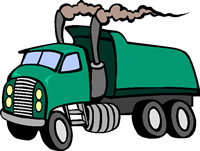 |
Change can be difficult, but if done little
by little, it may improve the quality of your day to day existence (life). When
you make changes for the better, you just feel better - and who can argue with
that? Try not to be discouraged if you donít suddenly become a whole new person.
Thatís not realistic. But if you implement just one new way of doing things
every few weeks, starting with the one you find easiest to do, youíll be on
the road to a healthier lifestyle.
~ Thanks to Gustavo Cavazos for his truck driver expertise with this article
and to Dr. Terence P. Hannigan for his editorial assistance.
Copyright ©
2003 10-4 Magazine and Tenfourmagazine.com
PO Box 7377 Huntington Beach, CA, 92615 tel. (714) 378-9990 fax (714)
962-8506